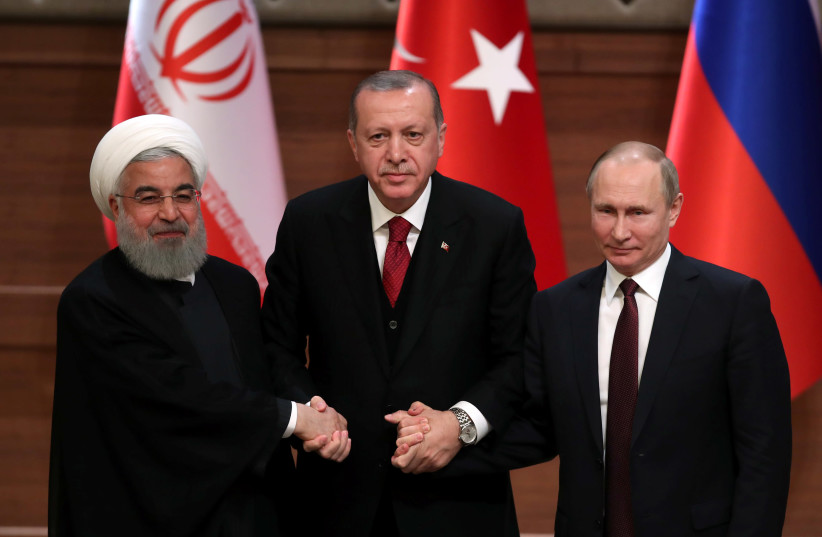Turkey and Russia are meeting in Kazakhstan under the banner of the Astana talks which go back five years, hoping to continue their collaboration on Syria issues.
Turkey, Russia and Iran have coordinated on Syria increasingly since 2017. That was part of a process that took place in the wake of Syrian rebels losing Aleppo, and Ankara deciding it needed to take control of the Syrian rebels, to use them to fight the US-backed Syrian Democratic Forces. Toward that end, Turkey sought to work with Iran and Russia to coordinate on Syria and to remove the US from the war-torn country.
During the Trump era, the US ignored Turkey’s invasion of Afrin in Syria and the ethnic cleansing of 160,000 Kurds. The US under former president Donald Trump, who used to speak to Turkish President Recep Tayyip Erdogan often, abandoned its SDF partners and enabled a Turkish invasion in October 2019. The ensuing chaos empowered Russia, Iran and Turkey.
According to Ankara-based media, “Delegations from Turkey, Russia and Iran have met in Kazakhstan’s capital, Nur-Sultan, for the 17th meeting of the Astana process that aims to find a solution to the decade-long crisis in Syria.” There were scant details on what each side hopes to achieve from this meeting.
Turkey is sending its Foreign Ministry’s director-general for Syria, Selcuk Unal, Russia is sending special envoy to Syria Alexander Lavrentiev, and Iran is represented by Ali Asghar Khaji. Syrian opposition members are backed by Turkey and are also represented. The US, which backs the SDF and helps control part of eastern Syria, is not represented.

Washington has generally sidelined its own SDF partners in Geneva and other forums, making sure that no one who works with the US gets any say in the future of Syria. This odd stance has resulted in the Kurdish region – and other minorities who ended up living under the US-backed areas of Syria – having no say.
They only get a say if they work with the Syrian regime. But when they work with the regime, US-based think tanks then accuse them of collaborating with the regime and not being trustworthy. This is the Catch-22 of America’s Syria policy. People in eastern Syria are excluded by Turkey, Iran and Russia, but also by America.
“Khawla Mattar, deputy special representative of the United Nations to Syria, is also attending the talks, while Iraq, Jordan and Lebanon are participating as observers,” Turkey’s Daily Sabah reported.
“The talks are scheduled to take place for two days and will address several issues, including the current situation, the transfer of humanitarian aid, the launching of the Syrian constitutional committee’s works in Geneva, the exchange of prisoners, the release of hostages and further confidence-building measures,” the report said.
Russia says it wants a ceasefire, although it is unclear what that would entail. Turkish-backed extremists near Tel Tamr continue to shell Kurdish and Christian areas. Areas controlled by Turkey are generally ethnically cleansed of all minorities, such as Kurds, Christians and Yazidis.
Ankara also works with extremist groups that operate from its areas. When the US killed the leader of ISIS in 2019, he was found to be living near the Turkish border. Victims of ISIS were often trafficked to Turkey, and many extremists have transited the country over the years after wreaking havoc in eastern Syria.
It is unclear now whether Turkey, Iran and Russia can come to some agreement to preserve the status quo in Syria, or if more operations by Turkey or the Syrian regime will take place. Russia has reportedly said, “We will give priority to this issue in our meetings with both our Turkish and Iranian partners.” There is talk of a “constitutional committee” relating to Syria as well.
It appears that, as usual, those groups working with America will be excluded, while Washington has not promised them that the US backs them having a future in Syria.
The US administration’s previous envoy to Syria said America’s role with the SDF was temporary, transactional and tactical. That doesn’t give much hope to Syrians in the eastern parts of the country.
